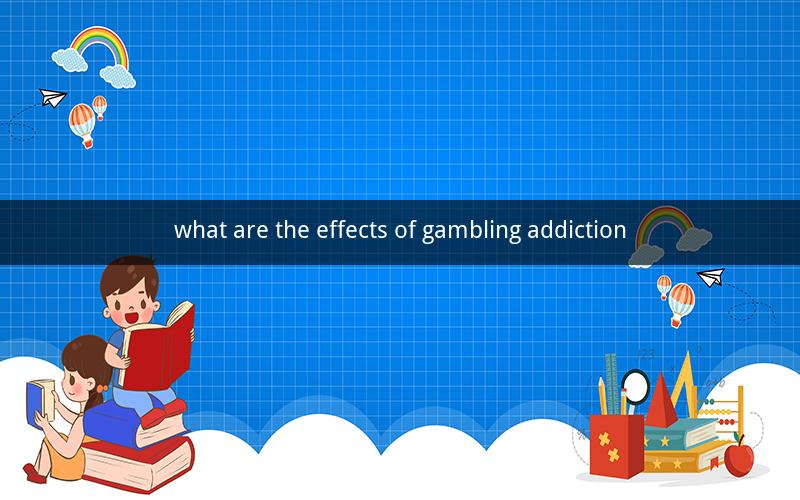
Contents
1. Understanding Gambling Addiction
2. Psychological Effects of Gambling Addiction
3. Social Effects of Gambling Addiction
4. Financial Effects of Gambling Addiction
5. Health Effects of Gambling Addiction
6. Legal and Ethical Implications
7. Treatment and Prevention
Understanding Gambling Addiction
Gambling addiction, also known as pathological gambling, is a behavioral disorder characterized by an inability to control the urge to gamble, despite negative consequences. It is a growing concern worldwide, affecting millions of individuals and their families. To understand the effects of gambling addiction, it is crucial to explore its various dimensions.
Psychological Effects of Gambling Addiction
Gambling addiction can have severe psychological effects on individuals. The following are some of the psychological consequences:
- Depression: Individuals with gambling addiction often experience feelings of sadness, hopelessness, and worthlessness.
- Anxiety: The fear of losing money and the urge to chase losses can lead to increased anxiety levels.
- Stress: The financial strain and social isolation caused by gambling addiction can contribute to chronic stress.
- Impaired Cognitive Function: Chronic stress and anxiety can affect memory, concentration, and decision-making abilities.
- Suicidal Thoughts: In extreme cases, gambling addiction can lead to suicidal thoughts and attempts.
Social Effects of Gambling Addiction
Gambling addiction can have a profound impact on an individual's social life. The following are some of the social consequences:
- Relationship Breakdown: Gambling addiction can strain relationships with family, friends, and partners.
- Social Isolation: Individuals with gambling addiction may withdraw from social activities and isolate themselves.
- Financial Strain: The financial burden of gambling can lead to arguments and conflicts with loved ones.
- Legal Problems: Illegal gambling activities can result in legal consequences, further isolating individuals from society.
Financial Effects of Gambling Addiction
Gambling addiction can have devastating financial consequences. The following are some of the financial effects:
- Debt: Individuals with gambling addiction often accumulate significant debt, which can lead to bankruptcy.
- Loss of Income: The time spent gambling can result in a loss of employment and income.
- Financial Fraud: Individuals with gambling addiction may resort to fraudulent activities to fund their addiction.
- Homelessness: In extreme cases, gambling addiction can lead to the loss of one's home and homelessness.
Health Effects of Gambling Addiction
Gambling addiction can have adverse health effects on individuals. The following are some of the health consequences:
- Cardiovascular Disease: The stress and anxiety associated with gambling addiction can increase the risk of heart disease and stroke.
- Sleep Disorders: The constant worry and stress can disrupt sleep patterns, leading to sleep disorders.
- Substance Abuse: Individuals with gambling addiction may turn to alcohol or drugs to cope with their addiction.
- Suicide: In some cases, gambling addiction can lead to suicidal thoughts and attempts.
Legal and Ethical Implications
Gambling addiction raises several legal and ethical issues. The following are some of the concerns:
- Illegal Gambling: Engaging in illegal gambling activities can lead to legal consequences, including fines and imprisonment.
- Fraud and Theft: Individuals with gambling addiction may resort to fraudulent activities to fund their addiction, which can lead to legal problems.
- Ethical Concerns: The promotion of gambling can be ethically problematic, particularly when it targets vulnerable populations.
Treatment and Prevention
Treating gambling addiction requires a comprehensive approach, including therapy, support groups, and financial counseling. Prevention strategies involve raising awareness about the risks of gambling addiction and promoting responsible gambling practices.
Conclusion
Gambling addiction is a complex and multifaceted disorder with significant psychological, social, financial, and health consequences. Understanding the effects of gambling addiction is crucial for early detection, treatment, and prevention. By addressing the root causes and providing appropriate support, individuals with gambling addiction can overcome their struggles and lead healthier, more fulfilling lives.
Questions and Answers
1. What are the psychological effects of gambling addiction?
- Depression, anxiety, stress, impaired cognitive function, and suicidal thoughts.
2. How does gambling addiction affect social relationships?
- Relationship breakdown, social isolation, financial strain, and legal problems.
3. What are the financial consequences of gambling addiction?
- Debt, loss of income, financial fraud, and homelessness.
4. How does gambling addiction impact health?
- Cardiovascular disease, sleep disorders, substance abuse, and suicide.
5. What legal and ethical issues arise from gambling addiction?
- Illegal gambling, fraud and theft, and ethical concerns regarding the promotion of gambling.
6. What treatments are available for gambling addiction?
- Therapy, support groups, and financial counseling.
7. How can gambling addiction be prevented?
- Raising awareness about the risks of gambling addiction and promoting responsible gambling practices.
8. Can gambling addiction be cured?
- While there is no cure for gambling addiction, it can be effectively managed with appropriate treatment and support.
9. Are there any genetic factors that contribute to gambling addiction?
- Yes, some research suggests that genetic factors may play a role in the development of gambling addiction.
10. How can individuals seek help for gambling addiction?
- Individuals can seek help from mental health professionals, support groups, and organizations dedicated to treating gambling addiction.